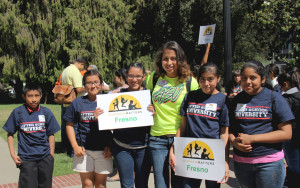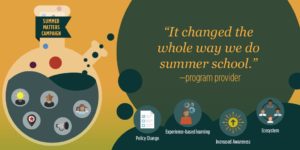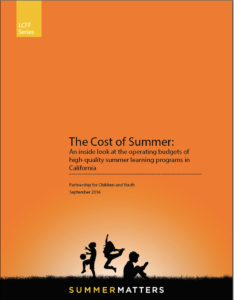Reports
How Summer Learning Strengthens Student Success
How Summer Learning Strengthens Students’ Success is an independent evaluation of three Summer Matters pilot programs. The report measures impact on students’ academic achievement – both during the summer months and extending throughout the school year. Analysis of the data concluded high quality summer learning programs in Fresno, Los Angeles and Sacramento have bolstered students’ academic success by strengthening their academic skills in general and literacy skills in particular, and increasing the effectiveness of their work habits and confidence in their abilities as learners.
The Skills to Pay the Bills
Nonprofit organizations serving young people exist to provide meaningful opportunities for those young people to build their skills; experience positive, supportive relationships; and prepare for the future. No one would judge an organization’s worth by its financial soundness alone, but financially unhealthy programs threaten an organization’s ability to achieve its mission. Unfortunately, although they are critical to effective management, core organizational capabilities and effective administrative functions often are mistakenly perceived as peripheral to an organization’s mission.
How Summer Matters is Changing the Course of Expanded Learning in California.
By the time a low-income child enters fifth grade, he or she can be up to three grade levels behind other classmates in reading and math. One key contributor to this gap is the absence of learning opportunities during summer months, which results in learning loss.
National Academy of Sciences Hosts Summer Learning Panel
On August 25, 2016, The Institute of Medicine/National Academy of Science hosted a panel on summertime opportunities in Washington DC. The workshop validated the value of a summer learning approach not only for student academic achievement, but also for students’ health outcomes. A report outlining the workshop was just published.
The Cost of Summer
Summer can be a costly time for low-income families. According to Jennifer Peck, Executive Director of the Partnership for Children and Youth, “While middle-income children retain knowledge or, in many cases, make gains over the summer, low-income children fall behind.” Summer learning programs are a cost effective way to prevent summer learning loss and close the opportunity gap. In order to better understand the cost of such investments, Summer Matters conducted a small survey of partner organizations offering high quality summer learning opportunities in California.





